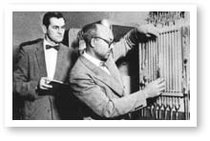Hawkins, Walter Lincoln

For years the communications industry has been one of the largest users of polymer products, especially for wire and cable coatings. But exposure to sunlight and extreme temperatures causes these coatings to deteriorate, a problem that Walter Lincoln Hawkins (1911–1992) and Vincent L. Lanza of Bell Laboratories tackled in 1956. They first developed a special plastics additive that inhibits oxidation of the polymeric material. Hawkins then designed a laboratory test using infrared spectroscopy to predict the weatherability of a plastic surface, working also with Maureen G. Chan.
A native of Washington, D.C., Hawkins was orphaned at an early age and raised by a sister. Yet in the middle of the Depression he found enough family support and personal confidence to disregard the advice of well-meaning teachers who were convinced that an African American could never become a chemical engineer. Hawkins headed to Rensselaer Polytechnic Institute to complete his engineering degree and then went on to receive a master's degree in chemistry at Howard University and a doctorate at McGill University in Montreal, where he specialized in cellulose chemistry. After a postdoctoral fellowship at Columbia University he was hired in 1942 by Bell Laboratories, where he was the first African American scientist on the staff. He eventually became head of plastics chemistry research and development and assistant director of the Chemical Research Laboratory.
Hawkins was an active leader in efforts to expand the nation's pool of scientific talent, as first chairman of the American Chemical Society's Project SEED (Summer Educational Experience for the Economically Disadvantaged)—created to promote chemistry among economically disadvantaged youth—and as a board member of several educational institutions. He was honored on several occasions for this work and for his contributions to polymer science, including the award of the National Medal of Technology, presented to him by the President of the United States just two months before his death.
Further Reading